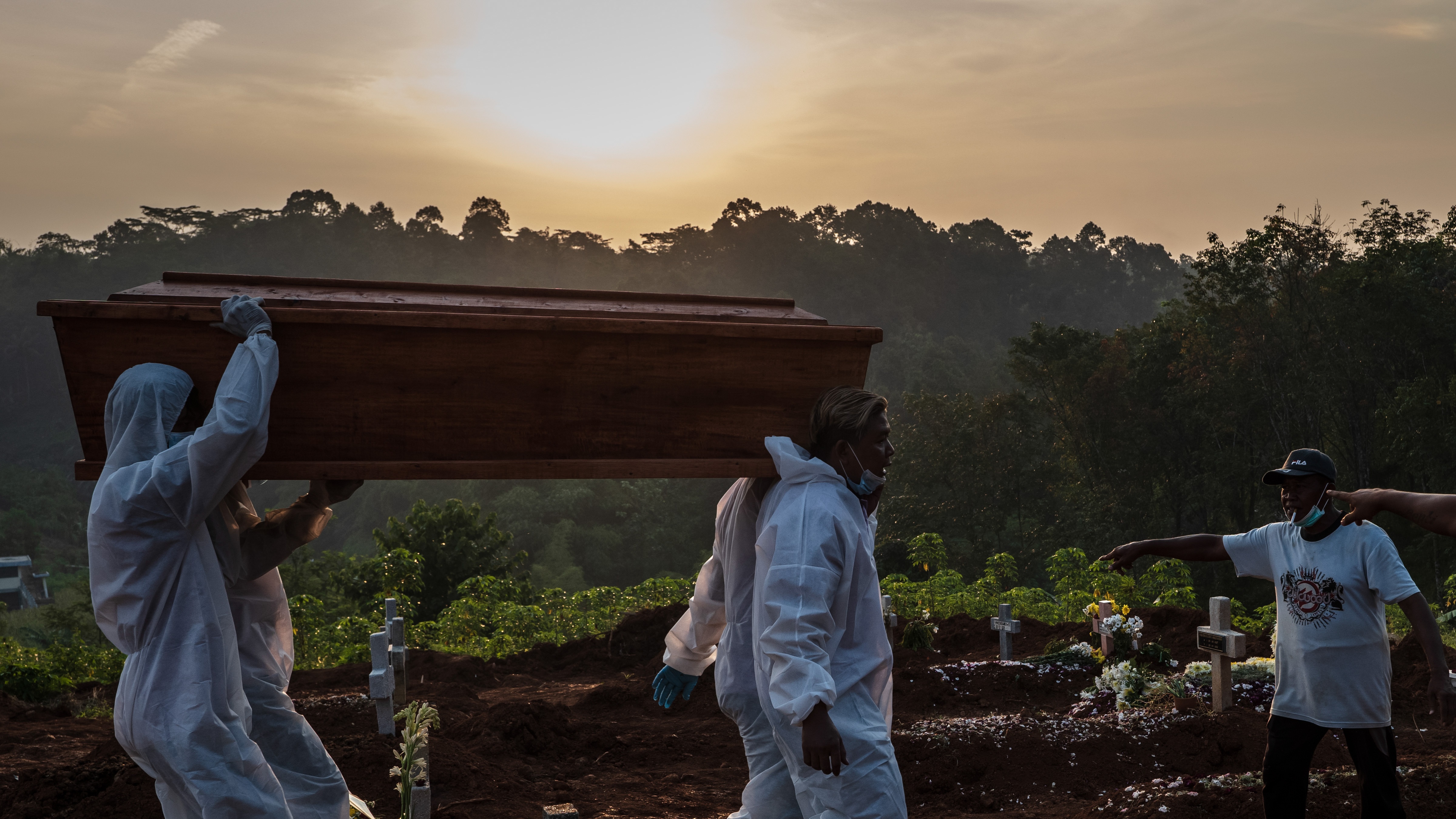‘New Asian epicentre’: Indonesia overtakes India as Covid-19 infections surge
Rapid spread of highly infectious Delta variant triggers hospital bed and oxygen shortages

A free daily email with the biggest news stories of the day – and the best features from TheWeek.com
You are now subscribed
Your newsletter sign-up was successful
Indonesia is braced for its worst outbreak of Covid-19 so far after a near vertical increase in infections pushed it beyond India to become the most impacted Asian nation.
The world’s fourth most populous country has recorded more than 40,000 new cases for two days running, prompting officials to warn that the highly infectious Delta variant “is spreading outside the most populous island of Java”, Nikkei Asia reports.
Indonesia now has around 132 cases per million people, compared with India’s 26 as of Sunday, according to Oxford University tracking. The Southeast Asian nation’s per capita death rate is also higher, averaging “three per million people, compared with less than one in the south Asian country”, the news site adds.
The Week
Escape your echo chamber. Get the facts behind the news, plus analysis from multiple perspectives.

Sign up for The Week's Free Newsletters
From our morning news briefing to a weekly Good News Newsletter, get the best of The Week delivered directly to your inbox.
From our morning news briefing to a weekly Good News Newsletter, get the best of The Week delivered directly to your inbox.
‘Brink of disaster’
Indonesia on Tuesday reported 47,899 new infections, a record high, up from 40,427 the previous day. India's cases, meanwhile, dropped to 32,906 from 37,154. The rapid rise in infections is “believed to be underestimated due to poor rates of testing and contact tracing”, The Telegraph reports, but has nonetheless caused “similar hospital bed and oxygen shortages seen in India during its crisis earlier this year”.
Health minister Budi Sadikin told reporters on Tuesday that Covid-19 bed occupancy rates in the nation’s capital, Jakarta, are close to 90%, adding that the government is preparing for an increase of 30% over the next two weeks, as well as accelerating cases in other regions.
Hospitals on Java, the country’s most populated island, have been “deluged in recent weeks, with many people struggling to get treatment and hundreds dying while self-isolating”, Reuters reports.
A free daily email with the biggest news stories of the day – and the best features from TheWeek.com
Meanwhile, “cases and bed occupancy rates also have risen in parts of Sumatra and Kalimantan”, the news agency adds, as well as “more remote regions like West Papua, where health facilities are less equipped to handle an outbreak”.
Senior minister Luhut Pandjaitan told a news conference that the country is already experiencing “our worst-case scenario”, adding: “If we’re talking about 60,000 [cases a day] or slightly more than that, we’re okay. We are hoping not for 100,000, but even if we get there, we are preparing for that.”
Experts have predicted that “if the spread continues unabated” it may “push Indonesia’s health care system to the brink of disaster”, CNN says, a similarly grim projection to the ones made about India’s overwhelmed health system in late April.
The island nation is “reaping the costs of not implementing strict lockdowns nor investing enough in efficient contact-tracing systems”, with health minister Sadikin previously telling the broadcaster that authorities had not realised how quickly the virus had been spreading in this latest wave of the strain that has come to dominate global infections.
Vaccine push
The Philippines announced yesterday that it would ban travellers from Indonesia amid the rapid rise in cases, while “the government has scrambled to boost capacity and secure sufficient oxygen supply”, The Telegraph says.
Authorities have also “converted several buildings into isolation facilities”, Reuters reports, as well as deploying “fresh graduate doctors and nurses to treat Covid-19 patients and importing treatment drugs and oxygen”.
The true scale of Indonesia’s outbreak was illustrated by a survey published on Saturday that revealed “almost half the population of Indonesia’s national capital Jakarta may have contracted Covid-19”, The Independent says.
The study conducted by Jakarta’s provincial health office, the Eijkman Institute for Molecular Biology and US Centers for Disease Control and Prevention found that 44.5% of those tested had coronavirus antibodies.
This equates to around 4.7 million of the total 10.6 million people in the Indonesian capital and “is at least 12 times the number of confirmed cases – 382,000 – of Covid-19 reported in Jakarta until that time”, the paper adds.
The islands of Bali and Java have been placed under emergency lockdown, while the government said it is “analysing the situation” to decide whether to “extend the current emergency coronavirus curbs that will expire on July 20”, Reuters says.
A delivery of 3.5 million doses of the Oxford-AstraZeneca vaccine arrived in Indonesia on Tuesday as part of the global jab sharing programme Covax. Authorities are now looking to boost the vaccination rollout that has so far seen fewer than 20 per 100 people receive at least one dose, according to Oxford University tracking.
President Joko Widodo yesterday told a press briefing that vaccines are Indonesia’s only “hope to recover from this global health crisis”, adding: “Fair and equal access to vaccines must be guaranteed since we see there is still a wide gap in vaccine access throughout the country.”
-
 Why is the Trump administration talking about ‘Western civilization’?
Why is the Trump administration talking about ‘Western civilization’?Talking Points Rubio says Europe, US bonded by religion and ancestry
-
 Quentin Deranque: a student’s death energizes the French far right
Quentin Deranque: a student’s death energizes the French far rightIN THE SPOTLIGHT Reactions to the violent killing of an ultra-conservative activist offer a glimpse at the culture wars roiling France ahead of next year’s elections.
-
 Secured vs. unsecured loans: how do they differ and which is better?
Secured vs. unsecured loans: how do they differ and which is better?the explainer They are distinguished by the level of risk and the inclusion of collateral
-
 A Nipah virus outbreak in India has brought back Covid-era surveillance
A Nipah virus outbreak in India has brought back Covid-era surveillanceUnder the radar The disease can spread through animals and humans
-
 Trump HHS slashes advised child vaccinations
Trump HHS slashes advised child vaccinationsSpeed Read In a widely condemned move, the CDC will now recommend that children get vaccinated against 11 communicable diseases, not 17
-
 A fentanyl vaccine may be on the horizon
A fentanyl vaccine may be on the horizonUnder the radar Taking a serious jab at the opioid epidemic
-
 Health: Will Kennedy dismantle U.S. immunization policy?
Health: Will Kennedy dismantle U.S. immunization policy?Feature ‘America’s vaccine playbook is being rewritten by people who don’t believe in them’
-
 How dangerous is the ‘K’ strain super-flu?
How dangerous is the ‘K’ strain super-flu?The Explainer Surge in cases of new variant H3N2 flu in UK and around the world
-
 How music can help recovery from surgery
How music can help recovery from surgeryUnder The Radar A ‘few gentle notes’ can make a difference to the body during medical procedures
-
 Vaccine critic quietly named CDC’s No. 2 official
Vaccine critic quietly named CDC’s No. 2 officialSpeed Read Dr. Ralph Abraham joins another prominent vaccine critic, HHS Secretary Robert F. Kennedy Jr.
-
 This flu season could be worse than usual
This flu season could be worse than usualIn the spotlight A new subvariant is infecting several countries